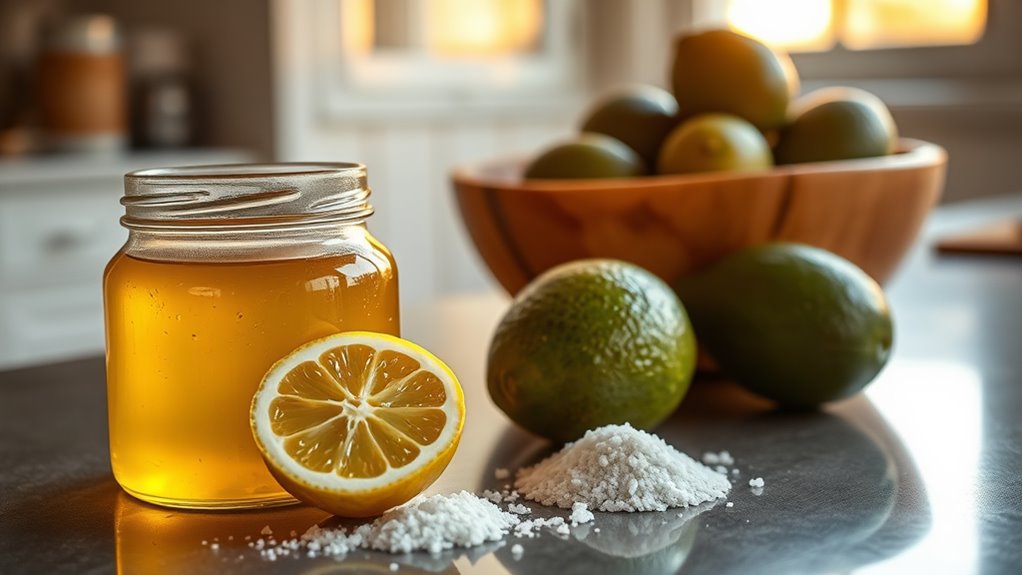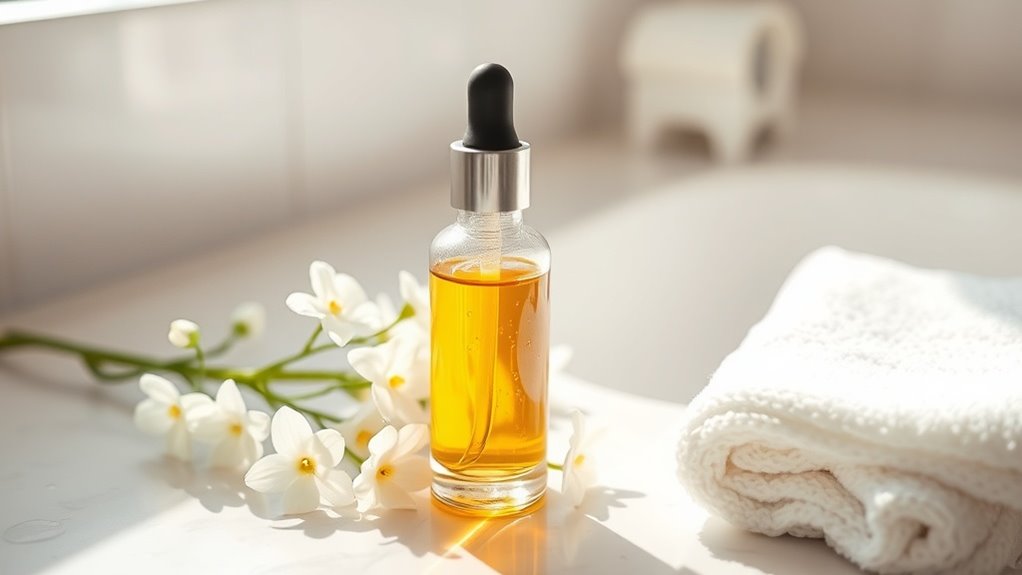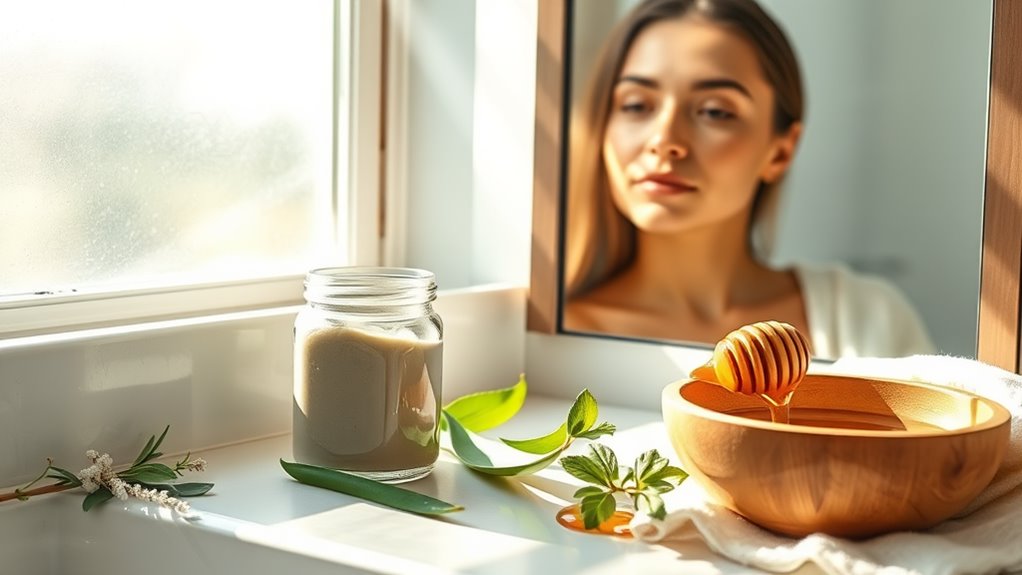The Acne Solution That’s Been Hiding in Your Pantry
Like a hidden gem in a treasure chest, your pantry holds potential solutions for acne that you may not have considered. Scientific studies reveal that common kitchen ingredients possess properties that can effectively combat breakouts. Honey, apple cider vinegar, coconut oil, and turmeric are just a few examples. Understanding how these items work can lead to clearer skin. So, what are the specific benefits and applications of these natural remedies?
Key Takeaways
- Honey’s antibacterial properties help fight acne-causing bacteria and reduce inflammation on the skin.
- Apple cider vinegar balances skin pH with its astringent qualities, making it an effective acne treatment.
- Coconut oil’s lauric acid offers antimicrobial effects, which can aid in reducing breakouts.
- Turmeric acts as a natural anti-inflammatory, soothing irritated skin and minimizing redness from acne.
- Oatmeal can be used as a soothing paste to calm irritated skin and promote healing.
Understanding Acne and Its Causes
What causes acne to erupt on your skin?
Acne occurs when hair follicles become clogged with oil, dead skin cells, and bacteria.
Acne forms when hair follicles get blocked by a mix of oil, dead skin cells, and bacteria.
Hormonal fluctuations, particularly during puberty or menstruation, can increase oil production, leading to breakouts.
Stress and certain medications may also contribute.
Additionally, diet plays a role; high glycemic foods can exacerbate acne. Certain unseen food triggers may also be linked to increased breakouts.
While you might consider a DIY acne remedy, it’s crucial to understand the underlying causes first.
Effective treatments target inflammation and bacteria while promoting skin cell turnover.
Identifying these factors can help you choose the right approach to manage and reduce your acne effectively.
Key Pantry Ingredients for Acne Relief
Your kitchen pantry might hold the key to alleviating acne symptoms.
Several common ingredients possess properties that can help reduce inflammation and promote skin healing.
Consider incorporating these pantry staples into your routine:
-
Honey – Its antibacterial properties can fight acne-causing bacteria.
-
Apple Cider Vinegar – Known for its astringent qualities, it helps balance skin pH.
-
Coconut Oil – Contains lauric acid, which has antimicrobial effects.
-
Turmeric – This anti-inflammatory spice can soothe irritated skin and reduce redness.
Utilizing these ingredients may provide a natural approach to managing acne effectively. Additionally, many people have successfully found affordable remedies that can be easily integrated into their daily skincare routines.
DIY Acne Remedies You Can Try
Wondering how to harness the power of pantry ingredients for acne relief? You can try a few effective DIY remedies.
Honey, with its antibacterial properties, can reduce inflammation; simply apply a thin layer to the affected area.
Apple cider vinegar acts as an astringent, balancing skin pH—mix equal parts with water before applying.
Oatmeal soothes irritated skin; create a paste with water and leave it on for 10-15 minutes.
Lastly, tea tree oil, known for its antimicrobial activity, can be diluted with a carrier oil and applied sparingly.
Incorporating natural detox methods into your skincare routine may enhance the effectiveness of these remedies.
Always patch-test new ingredients to avoid adverse reactions.
How to Apply Your Acne Treatment
How effectively you apply your acne treatment can significantly influence its success.
The effectiveness of your acne treatment hinges on the proper application technique.
Following these steps ensures you’re maximizing the benefits of your chosen remedy:
-
Cleanse your skin: Always start with a gentle cleanser to remove dirt and oil.
-
Pat dry: Use a clean towel to gently pat your skin dry, avoiding harsh rubbing.
-
Apply treatment: Use a cotton swab or clean fingers to apply the treatment directly on blemishes.
-
Moisturize: After the treatment dries, follow up with a non-comedogenic moisturizer to maintain hydration. Incorporating salicylic acid into your routine can enhance its effectiveness in treating acne.
Following these steps can lead to clearer skin and boost your confidence.
Tips for Maximizing Results
To achieve the best results from your acne treatment, consider integrating a few additional practices into your skincare routine.
First, maintain a consistent application schedule to enhance effectiveness. Second, cleanse your skin gently twice daily to remove excess oil and impurities without over-drying. Third, avoid touching your face, as this can introduce bacteria and worsen breakouts.
Additionally, stay hydrated and eat a balanced diet rich in antioxidants to support skin health, while also being mindful to avoid foods that may contribute to acne such as dairy and sugar.
Lastly, monitor your skin’s response to the treatment and consult a dermatologist if you experience irritation or persistent issues.
Consistency and awareness are key to maximizing your results.
Maintaining Clear Skin Naturally
What if maintaining clear skin could be achieved through simple, natural methods?
You can incorporate these strategies into your daily routine for healthier skin:
-
Hydrate: Drink plenty of water to flush out toxins and keep skin supple.
-
Nutrition: Eat a balanced diet rich in antioxidants, like fruits and vegetables, to combat inflammation.
-
Sleep: Aim for 7-9 hours of quality sleep; it’s crucial for skin repair.
-
Stress Management: Practice mindfulness or yoga to lower stress levels, which can trigger acne. Additionally, reducing acne trigger foods such as sugar and dairy may also contribute to clearer skin.




